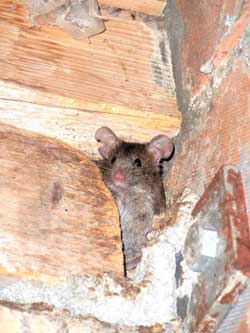Long-lived mice are less active

Female mice with greater life expectancy are less active and less explorative than their fellow females with lower life expectancy. UZH<br>
They also eat less than their fellow females with a lower life expectancy. Behavioral biologists from the University of Zurich reveal that there is a correlation between longevity and personality for female house mice, and a minimum amount of boldness is necessary for them to survive.
Risky behavior can lead to premature death – in humans. Anna Lindholm and her doctoral student Yannick Auclair investigated whether this also applies to animals by studying the behavior of 82 house mice. They recorded boldness, activity level, exploration tendency and energy intake of female and male house mice with two different allelic variants on chromosome 17, thereby testing predictions of “life-history theory” on how individuals invest optimally in growth and reproduction. According to this theory, individuals with a greater life expectancy will express reactive personality traits and will be shy, less active and less explorative than individuals with a lower survival expectation.
Is personality reflected in life expectancy?
Female mice of the t haplotype, one of the two genetic variants on chromosome 17, are known to live longer. The t haplotype in house mice is a naturally occurring selfish genetic element that is transmitted to 90 percent of the offspring by t carrying males. Embryos that inherit a t copy from both parents, however, die before birth. With his experiment, Yannick Auclair wanted to investigate whether there was a correlation between this selfish genetic element and the personality of the mice.
Live fast, die young – even in mice
The researchers reveal that the longer-lived t haplotype females are less active than the shorter-lived non-carrier females. They also consume less food, are less explorative and thus express reactive personality traits favouring cautiousness and energy conservation, as predicted by theory. “For the first time, we report personality traits associated with a selfish genetic element that influences life expectancy” says Auclair. According to the research team, female mice with a longer life expectancy follow the strategy “live slow, die old” whereas those with a shorter life expectancy live according to the principle “live fast, die young”.
In contrast to the predictions of the “life-history” theory, there are no extremely individuals among t haplotype female mice. The researchers suppose that selection does not favor mice that are too cautious. “In order for a mouse to find food and be able to reproduce, clearly a minimum level of boldness is required,” explains Auclair. “In such a situation, large variation will not develop.”
Literature:
Yannick Auclair, Barbara König, Anna K. Lindholm. A selfish genetic element influencing longevity correlates with reactive behavioural traits in female house mice. PLoS ONE. June 24, 2013. doi:10.1371/journal.pone.0067130.
Contact:
Prof. Dr. Barbara König
Yannick Auclair
Institute of Evolutionary Biology and Environmental Studies
University of Zurich
Tel. +41 44 635 52 70
E-Mail: barbara.koenig@ieu.uzh.ch
E-Mail: yannick.auclair@ieu.uzh.ch
Media Contact
More Information:
http://www.uzh.chAll latest news from the category: Life Sciences and Chemistry
Articles and reports from the Life Sciences and chemistry area deal with applied and basic research into modern biology, chemistry and human medicine.
Valuable information can be found on a range of life sciences fields including bacteriology, biochemistry, bionics, bioinformatics, biophysics, biotechnology, genetics, geobotany, human biology, marine biology, microbiology, molecular biology, cellular biology, zoology, bioinorganic chemistry, microchemistry and environmental chemistry.
Newest articles

Properties of new materials for microchips
… can now be measured well. Reseachers of Delft University of Technology demonstrated measuring performance properties of ultrathin silicon membranes. Making ever smaller and more powerful chips requires new ultrathin…

Floating solar’s potential
… to support sustainable development by addressing climate, water, and energy goals holistically. A new study published this week in Nature Energy raises the potential for floating solar photovoltaics (FPV)…

Skyrmions move at record speeds
… a step towards the computing of the future. An international research team led by scientists from the CNRS1 has discovered that the magnetic nanobubbles2 known as skyrmions can be…





















